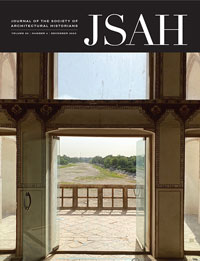Jun 27, 2014
by
Chicago Architecture Biennial
Chicago Architecture Biennial Press Release BP Pledges $2.5 Million for 2015 event that highlights Chicago Architecture and Explores Global Ideas
The largest international survey of contemporary architecture in North America will take place in Chicago in the fall of 2015. The event will include robust public programming and exhibitions featuring the world’s leading architectural talent and will be presented by the City of Chicago, the Graham Foundation, and the recently-formed Chicago Architecture Biennial.
 The historic Chicago Cultural Center will serve as the event hub for the inaugural Biennial, which will take place from October 1, 2015 through January 3, 2016. The Biennial will be funded through private donations, with a lead gift of $2.5 million already committed by BP as the Presenting Sponsor.
The historic Chicago Cultural Center will serve as the event hub for the inaugural Biennial, which will take place from October 1, 2015 through January 3, 2016. The Biennial will be funded through private donations, with a lead gift of $2.5 million already committed by BP as the Presenting Sponsor.
“Architecture defines a city, and no city has been defined by its architecture—or has influenced global architectural design—like Chicago," said Mayor Rahm Emanuel. “The Chicago Architecture Biennial will showcase the city’s widely-respected architectural heritage, promote architecture as one of our thriving creative sectors, and deliver a rich cultural experience to our neighborhoods."
“In 1893, the World’s Columbian Exposition placed Chicago squarely on the global stage as a center of innovation,” said Mayor Emanuel. “In 2015, the Chicago Architecture Biennial will continue our legacy as the world’s gathering place for exploring new ideas.”
Thousands of architecture professionals, students, and cultural enthusiasts are expected to attend and experience the large-scale exhibitions at the Cultural Center and spaces around the city. These installations will feature the work of both established and emerging architects and address the major concerns of our time: the social, environmental, aesthetic, technological, and economic issues that shape the world we live in.
Installations will be created in Millennium Park and other Chicago neighborhoods to encourage all to explore the city as the canvas for a survey of architecture of the past, present, and future. The Department of Cultural Affairs and Special Events (DCASE) will be the lead agency representing the City.
“Together with the City of Chicago, we will create a significant international forum for the exploration of new ideas in architecture,” said Sarah Herda, Director of the Graham Foundation and Co-Artistic Director of the Chicago Architecture Biennial. “Chicago is the birthplace of modernism in architecture and every architect in the world knows our city’s history of innovation in the field through the work of architects such as Louis Sullivan, Frank Lloyd Wright and Mies van der Rohe. The Biennial will place Chicago, once again, at the forefront of the architectural imagination.”
Joining Herda as Co-Artistic Director will be Joseph Grima, an architect, writer, and curator who previously served as editor of Domus Magazine. Grima was the co-curator of the first edition of the Istanbul Design Biennial, a major international exhibition in 2012.
“For over a century, one of Chicago's main exports has been bold innovation in architecture,” said Grima. “The Chicago Architecture Biennial is an extraordinary opportunity to learn from Chicago and radically reconsider the challenges and opportunities facing contemporary architecture on a global stage. As we design the cities of tomorrow, new platforms of research and reflection are needed, and Chicago's history is a reminder that we shouldn't forget to be visionary. ”
Grima and Herda will consult with an International Advisory Committee, currently in formation, that includes acclaimed architects David Adjaye (London), Elizabeth Diller (New York), Jeanne Gang (Chicago), Frank Gehry (Los Angeles), and Stanley Tigerman (Chicago), along with Lord Peter Palumbo (London), Chairman of the Pritzker Prize for Architecture, and Hans Ulrich Obrist, Co-Director of Exhibitions and Programs and Director of International Projects at the Serpentine Gallery, London.
The Biennial will also work with famed artist Theaster Gates to develop installations and public programs on Chicago’s south side, and partner with an array of Chicago organizations to produce programs and collateral events, including: Zoë Ryan, Chair and John H. Bryan Curator of Architecture and Design, The Art Institute of Chicago; Wiel Arets, Dean of the Illinois Institute of Technology’s College of Architecture; Robert Somol, Director of the School of Architecture, University of Illinois at Chicago; Jonathan D. Solomon, incoming Director of the Department of Architecture, Interior Architecture, and Designed Objects, The School of the Art Institute of Chicago; Zurich Esposito, Executive Vice President, AIA Chicago; Madeleine Grynsztejn, Pritzker Director, Museum of Contemporary Art, Chicago; and Lynn Osmond, President and CEO of the Chicago Architecture Foundation. These and other local thought leaders will be engaged through the formation of a Chicago Host Committee to assist in planning.
“The Chicago Architecture Foundation is delighted that Chicago will be hosting the first architecture biennial in America,” said Osmond. “This event reflects our city’s position as the leader for architectural discourse and innovation for the future.”
BP, which sponsored the Gehry-designed bridge in Millennium Park, said they were pleased to be the lead sponsor of the project.
“BP has a long history of supporting programs, events, and institutions that make Chicago great and we’re proud to sponsor this celebration of the city’s contribution to world architecture,” said BP America Chairman and President John Mingé.
The Chicago Architecture Biennial will be coordinated by a newly-formed non-profit organization that will be headed by Chicago business and civic leader Louis Susman, former Ambassador to the Court of Saint James.
“Architecture is so important to the quality of life in the cities of the 21st century,” Susman said. “As a great global and architectural city, Chicago is the ideal place for a North American biennial of architecture. ”
The new group that Susman is leading, which is in formation, will support, produce, and present ideas and programs that convene the world’s leading practitioners, theorists, and commentators to explore, debate, and demonstrate the significance of architecture and related fields to contemporary society.
Founded in 1956, the Graham Foundation for Advanced Studies in the Fine Arts makes project-based grants to individuals and organizations and produces public programs to foster the development and exchange of diverse and challenging ideas about architecture and its role in the arts, culture, and society.
The Department of Cultural Affairs and Special Events (DCASE) is dedicated to enriching Chicago’s artistic vitality and cultural vibrancy. This includes fostering the development of Chicago’s non-profit arts sector, independent working artists and for-profit arts businesses; providing a framework to guide the city’s future cultural and economic growth, via the 2012 Chicago Cultural Plan; marketing the city’s cultural assets to a worldwide audience; and presenting high-quality, free and affordable cultural programs for residents and visitors.
Co-Artistic Directors Biographies
JOSEPH GRIMA
Joseph Grima is an architect, writer, curator, and researcher based in Genoa, Italy. From 2011 to August 2013 he was editor-in-chief of Domus, a monthly magazine of architecture, design, and art founded in 1928 by Gio Ponti and universally regarded as one of the most prestigious and authoritative publications in its field. Domus is today published in 8 languages and distributed in 88 countries around the world. Grima was the co-curator of the first edition of the Istanbul Design Biennial, a major international exhibition inaugurated in October 2012.
From 2007 to 2011 he served as Director of Storefront for Art and Architecture, a renowned non-profit gallery and exhibition space in New York, where he curated numerous exhibitions, symposia, conferences, and publications. He has also curated or participated in exhibitions in the Venice Architecture Biennale, Milan Triennale, New Museum in New York, Experimenta Design in Lisbon, Shenzhen-Hong Kong Bi-City Biennale of Architecture and Urbanism, and many others. He was a member of the official jury for the 2010 Venice Architecture Biennale directed by Kazuyo Sejima.
He is the author of several books including Instant Asia (Skira, 2007), a critical overview of the recent work of young and emerging architecture practices across the Asian continent, and co-editor of Shift: SANAA and the New Museum (Lars Mueller, 2008), and has contributed to numerous other books and publications. Open Source Architecture, co-authored with Carlo Ratti, is forthcoming. Over the past 10 years, he has written for a wide range of international magazines including Icon, AD, Abitare, Tank, Volume, An Arkitektur, ID and Urban China.
He has taught and lectured widely in Europe, Asia, and America, and was previously a professor at the Strelka Institute of Media, Architecture and Design in Moscow, Russia under the direction of Rem Koolhaas.
SARAH HERDA
Since 2006, Sarah Herda has been Director of the Graham Foundation for Advanced Studies in the Fine Arts. Founded in 1956, the Graham Foundation is the largest foundation in the United States committed to awarding project-based grants to individuals and institutions working at the forefront of architecture, and its role in the arts, culture and society. Herda is credited with transforming the Foundation’s headquarters, the historic Madlener House, into a world-class public venue for architecture exhibitions and building one of Chicago’s most celebrated public programs. In addition to hosting internationally renowned architects, artists, historians, and critics to present their work, Herda has produced an exhibition program featuring the work of Cecil Balmond, Thomas Demand, Bjarke Ingels, Nancy Holt, Judy Ledgerwood, Stanley Tigerman, Anne Tyng, Denise Scott Brown and Robert Venturi, among others.
From 1998 until 2006, Herda was Director and Curator at Storefront for Art and Architecture, an experimental exhibition space founded in New York City in 1982 that is recognized internationally as a vital platform for emerging ideas. While at Storefront, Herda collaborated with hundreds of architects and artists on a variety of projects, including more than 40 exhibitions.
Before being named Director of Storefront, Herda was the Director of the Center for Critical Architecture / Art and Architecture Exhibition Space in San Francisco, and she also worked in architectural publishing at The Monacelli Press.
Herda teaches at the School of Architecture at the University of Illinois at Chicago, and she has frequently been an invited critic and speaker at institutions such as the Architectural Association, London; Arkitekturmuseet, Stockholm; Canadian Centre for Architecture, Montreal; Columbia University, Graduate School of Architecture and Planning, New York; Harvard University, Graduate School of Design, Cambridge; IIT, School of Architecture, Chicago; Museum of Modern Art, New York; Princeton University, Graduate School of Architecture; and University of Michigan, School of Architecture, Ann Arbor, among others.
Currently, she serves on the board of directors of the Association of Architecture Organizations, and she serves on advisory boards for The Architect’s Newspaper, LAXART, the Mills College Art Museum, and Storefront for Art and Architecture. Herda is an Emerging Leader, class of 2015, at The Chicago Council on Global Affairs. In 2009, Herda was named one of Icon Magazine’s 20/20—a list of 20 architects and 20 designers who are changing the way we work and think.



 The historic Chicago Cultural Center will serve as the event hub for the inaugural Biennial, which will take place from October 1, 2015 through January 3, 2016. The Biennial will be funded through private donations, with a lead gift of $2.5 million already committed by BP as the Presenting Sponsor.
The historic Chicago Cultural Center will serve as the event hub for the inaugural Biennial, which will take place from October 1, 2015 through January 3, 2016. The Biennial will be funded through private donations, with a lead gift of $2.5 million already committed by BP as the Presenting Sponsor.